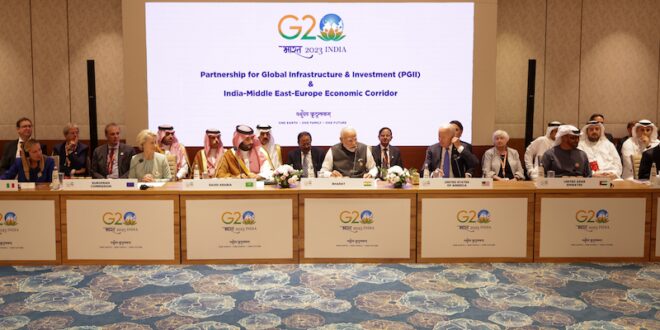The ongoing violence between Israel and Hamas has underlined the challenges facing an ambitious initiative to build a new trade route from India through the Middle East to Europe, according to analysts.
Announced at the Group of 20 summit held in India last month, the India-Middle East-Europe Economic Corridor, or IMEC, is seen as a modern-day spice route and an alternative to China’s Belt and Road Initiative. It is backed among others by the United States, the European Union and Saudi Arabia.
The corridor aims to establish a rail and shipping network linking the UAE, Saudi Arabia and Jordan to the Israeli port of Haifa on the Mediterranean Sea. Goods could then be shipped to Europe, bypassing the Suez Canal.
But as Israel conducts strikes on Gaza in response to the October 7 attack by Hamas militants, the region has been plunged into instability as the conflict becomes the deadliest of five Gaza wars.
“Now we are facing the possibility of a spillover of this war into the wider region and that is a reality check for IMEC,” according to Chintamani Mahapatra, founder of the Kalinga Institute of Indo Pacific Studies in New Delhi. “In the midst of this conflict, the whole idea of IMEC is getting lost.”
‘Wake-up’ call
Pointing out that the project involves passing through some of the most volatile regions of the Middle East, analysts say the war is a “wake-up” call about the scale of challenges IMEC will have to confront.
“The new war is a tragic reminder of just how difficult it will be to build out the new corridor,” Michael Kugelman, director of the South Asia Institute at the Wilson Center in Washington, said in emailed comments to VOA. “It’s not just a matter of financing challenges, but also of stability and diplomatic cooperation. The war makes it painfully clear that these conditions remain elusive.”
When the project was announced, Washington’s push for normalization of relations between Saudi Arabia and Israel was making headway and there were hopes that this could transform longstanding Mideast rivalries. A reliable link between Saudi Arabia and Israel is a crucial element of the project. An agreement between Israel and Saudi Arabia would have followed the U.S.-brokered Abraham Accords which saw Israel establish diplomatic relations in 2020 with three Arab countries.
“This project was worked under the presumption that there would be peace and stability in the region. But even if there is no wider conflict in the days and months to come, the future is now uncertain,” according to Manoj Joshi, Distinguished Fellow at the Observer Research Foundation in New Delhi.
He pointed out that the project requires billions of dollars of investment. “It involves building two to three thousand kilometers of rail lines. With the region now plunged into political instability, the question is who will invest?”
‘A counter to China’
The Western-backed corridor was not envisaged as just a trade route – it had geopolitical motives, according to analysts. It was seen as a counter to China, whose influence in the Middle East is rising.
It also aimed to build trust and political capital for normalization of ties between Israel and Saudi Arabia according to Kugelman. But he said that plan has been put on “cold ice” for now, although it could be reconstituted down the road.
“Saudi Arabia and Israel have strong strategic imperatives to normalize ties, but for Riyadh, the political costs of doing so while Israel is carrying out its brutal campaign in Gaza are too high,” he said.
New Delhi has said that the ongoing conflict will not dampen plans for the trade corridor. India, whose economy is growing, would be one of the major beneficiaries of the proposed route. Indian Prime Minister Narendra Modi has described IMEC as the “basis of world trade for hundreds of years to come.”
“IMEC is for the long term,” Finance Minister Nirmala Sitharaman said in Morocco last week where she attended a meeting of G-20 Finance Ministers. “While short-term glitches can have concerns and occupy our minds, we will keep engaging with all stakeholders.”
For New Delhi, the new trade route would slash shipping costs and expedite access to markets in the Middle East and Europe. India’s ties with countries like Saudi Arabia, UAE, Egypt as well as Israel have warmed significantly in recent years. Trade with these countries is rising while the European Union is its third largest trading partner.
As the current conflict unfolds, New Delhi has reached out to both Israel and the Palestinians.
In a show of solidarity with Israel, Prime Minister Modi condemned the Hamas assault as terrorist attacks. India has also reiterated its longstanding support for establishment of an independent Palestine state and sent humanitarian aid for Gaza.
But even if New Delhi is able to strike a balance in its ties with Arab countries and Israel, the project’s future hinges on how relations will shape up among the countries in the region.
“IMEC will not be buried, I won’t write its obit,” said Mahapatra. “When the dust settles down in West Asia, it will likely make headway. But in the midst of such a conflict, there is no possibility of a cooperative and positive proposal with the various countries involved,” said Mahapatra.
 Eurasia Press & News
Eurasia Press & News


